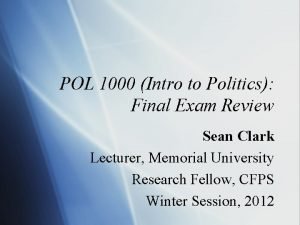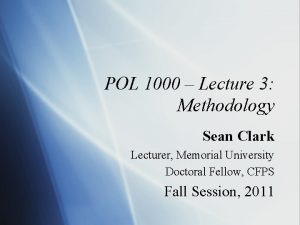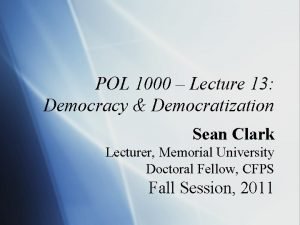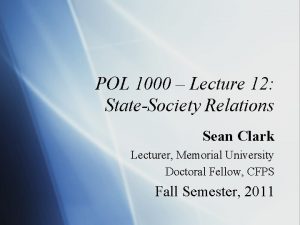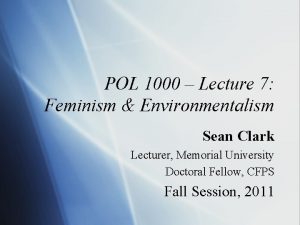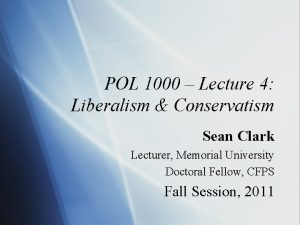POL 1000 Lecture 6 Fascism Sean Clark Lecturer






- Slides: 6

POL 1000 – Lecture 6: Fascism Sean Clark Lecturer, Memorial University Doctoral Fellow, CFPS Fall Session, 2011

Lecture Arc § 1. Origins. § 2. Basic Tenets. § 3. Fascism Today.

Origins § Response to the disasters of WWI & the Great Depression. § Bolshevik success in 1917, followed by Communist rebellions in ‘ 18, frightens middle classes into supporting extreme right wing. § Parliamentary democracy looked weak when blood on the streets & millions in the bread lines. § Nationalist stirrings (i. e. ‘mare nostrum’) popular in times of great hardship. § ‘ 20 s & ‘ 30 s: Mussolini & Hitler take control & set about utterly transforming the state (totalitarian ambition; & w tech & orgzn of WWI, now able to do it). § Italy: Fascist Party formed in 1919. March on Rome in 1922. Handed power by the king to prevent civil war (& loss of his throne). § ‘Black Shirts’ (paramilitaries) preserve power base. § Germany: Hitler & Nazis elected as >est party in parliament ’ 33. § Mar ‘Enabling Act’ & Gestapo remove political opposition. § Would distinguish themselves as particularly obsessed w concept of race, arguing duty was to race, not state (i. e. Hitler’s final days). § Would culminate in murder of 7 million in name of ‘racial purity. ’ § Try to organize society along military lines. Others mimic (i. e. Spain, Portugal, Romania, Japan). § During the Depression, enjoyed a large degree of success. § National projects (i. e. autobahn) kept people employed, when UK, US, Canada shedding workers. Rearm militaries to newfound stature. § Vitriol & aggression, however, would start WWII in 1939.

Basic Tenets § Based on Roman term fasces: bundle of rods tied together around an axe w a red ribbon. § Was symbol of unity & power (might of empire bound together by law). § Fits well with fascist affection for history & appeals to glory. § Rejects individual rights & freedoms in favour of national unity. § Aspirations should be collective, as all potential springs from the community (i. e. Hegel). § Individualism is spiritually empty bc it forces competition rather than cooperation, & cares only for material ends. § § § A people, bound by language, culture, tradition, & territory, should be about more than that. Life is a matter of duty to the collective, both now & for future generations. (Often glorified) elite given control over every aspect of society, from economy to sport & vacations. § Govt directed cooperation btn industrialists & workers (‘corporatism’). § Govt to run econ thru syndicates (where workers & owners bound together, not permitted to fight). § 22 created in Italy, over all parts of the econ. Germany: created 3 ‘super agencies’ (industry, ag, & labour). § Make no distinction between public and private life (is the core fascist innovation). § Romans cared little re your social life. The Nazis built beach resorts & put children in uniform. § Mussolini: ‘nothing outside the state, everything for the state. ’ § Is totalitarian (a term from Mussolini). Smash existing instxns to create new, monolithic whole. § Every aspect of life is to come under state control (conservatism seems tame by comparison. Is, ironically, of same ambitious intent as communism). § Arendt ’ 51: Totalitarianism is never content to rule by external means, namely, through the state and a machinery of violence; thanks to its peculiar ideology and the role assigned to it in this apparatus of coercion, totalitarianism has discovered a means of dominating and terrorizing human beings from within. ”

Fascism Today § Fascism as a political project did not last long. § Rubble of WWII made this clear. § Yet are still disciples, particularly amongst society’s most disaffected. § Unemployment, inflation, recession, crime, & intl insecurity make farright again appear palatable. § Anti-immigrant & xenophobic sentiments have gained popularity in recent years. § Le Pen placed 2 nd in French presidential voting. § Italy’s Lombard League, Belgium’s Flemish Block, DVU in Germany continue to win seats. § Various Neo-Nazi parties continue to exist & conduct demonstrations & even attacks, i. e. Russia. § Such racial nationalism often takes on the most horrific form. § Genocide often contemplated on behalf of considerations of ‘racial purity. ’ § A crucial outgrowth of fascism has been an obsession w race (i. e. Hitler, even as empire crumbled). § Some (i. e. Germany & Japan) took emphasis on collective & described it in racial terms. § Agmt: need ‘purity’ of people to achieve national goals. § More recently, ‘ethnic cleansing’ seen in Yugoslavia (1990 -1995) & present-day Darfur. § Fascist regimes may be defunct, but strands of the ideology endure. § Neither the social conditions underpinning discontent nor demagogues have disappeared.


